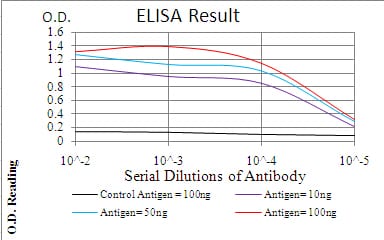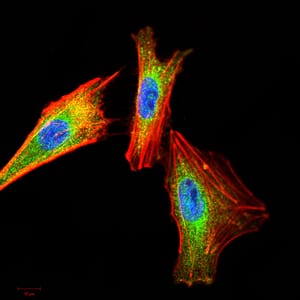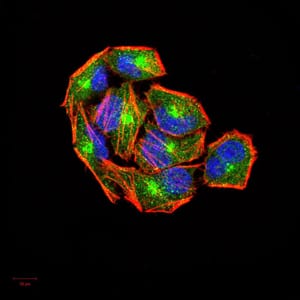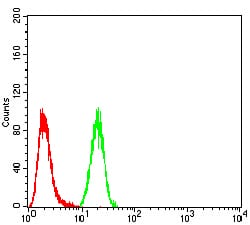



| WB | 咨询技术 | Human,Mouse,Rat |
| IF | 咨询技术 | Human,Mouse,Rat |
| IHC | 咨询技术 | Human,Mouse,Rat |
| ICC | 1/200 - 1/1000 | Human,Mouse,Rat |
| FCM | 1/200 - 1/400 | Human,Mouse,Rat |
| Elisa | 1/10000 | Human,Mouse,Rat |
| Aliases | IKBA; MAD-3; NFKBI |
| Entrez GeneID | 4792 |
| clone | 4D4F2 |
| WB Predicted band size | 35.6kDa |
| Host/Isotype | Mouse IgG1 |
| Antibody Type | Primary antibody |
| Storage | Store at 4°C short term. Aliquot and store at -20°C long term. Avoid freeze/thaw cycles. |
| Species Reactivity | Human |
| Immunogen | Purified recombinant fragment of human NFKBIA (AA: 150-291) expressed in E. Coli. |
| Formulation | Purified antibody in PBS with 0.05% sodium azide |
+ +
以下是关于NFKBIA(IκBα)抗体的3篇参考文献,包含文献名称、作者及摘要概括:
---
1. **"Phosphorylation of human IκBα by γ subunit of IκB kinase complex"**
*DiDonato, J.A., et al. (1997). Molecular and Cellular Biology.*
摘要:研究利用NFKBIA抗体通过免疫沉淀和Western blot技术,揭示了IκB激酶复合物(IKK)中γ亚基对IκBα(NFKBIA)的磷酸化调控机制,为NF-κB信号通路的激活提供了关键证据。
2. **"Mutational analysis of the NFKBIA gene in human malignancies"**
*Kato, T., et al. (2003). Cancer Research.*
摘要:通过免疫组织化学和测序技术,结合NFKBIA特异性抗体,发现多种癌症中NFKBIA基因的突变或缺失,提示其作为肿瘤抑制因子的潜在作用。
3. **"Lipopolysaccharide-induced degradation of IκBα requires transient phosphorylation and proteasome activity"**
*Chen, Z.J., et al. (1995). Journal of Biological Chemistry.*
摘要:使用NFKBIA抗体进行Western blot分析,证实LPS刺激后IκBα的磷酸化和蛋白酶体依赖性降解过程,阐明了炎症反应中NF-κB激活的分子机制。
---
以上文献均涉及NFKBIA抗体的实验应用(如Western blot、免疫沉淀等),并聚焦于其在信号通路、癌症及炎症中的功能研究。
The NFKBIA antibody is a crucial tool for studying the NF-κB signaling pathway, which regulates immune responses, inflammation, and cell survival. NFKBIA encodes IκBα, an inhibitory protein that binds to NF-κB transcription factors (e.g., p50/p65) in the cytoplasm, preventing their nuclear translocation and DNA binding. Upon stimulation (e.g., cytokines, pathogens, or stress), the IκB kinase (IKK) complex phosphorylates IκBα, marking it for ubiquitination and proteasomal degradation. This releases NF-κB, allowing it to activate target genes involved in immunity, apoptosis, and proliferation.
NFKBIA antibodies detect IκBα expression, phosphorylation, or degradation, enabling researchers to monitor NF-κB pathway activity. They are widely used in techniques like Western blotting, immunofluorescence, and immunoprecipitation. Dysregulation of IκBα—due to mutations, overexpression, or impaired degradation—is linked to chronic inflammation, autoimmune diseases, and cancers. For example, NFKBIA deletions or mutations are observed in Hodgkin’s lymphoma and melanoma, leading to constitutive NF-κB activation. These antibodies also aid in studying therapeutic agents targeting NF-κB, such as proteasome inhibitors or IKK modulators. Specificity is critical, as cross-reactivity with other IκB family members (e.g., IκBβ) can skew data. Researchers often validate these antibodies using knockout cell lines or siRNA to ensure accurate detection. Overall, NFKBIA antibodies are indispensable for elucidating NF-κB biology and its role in disease mechanisms.
×